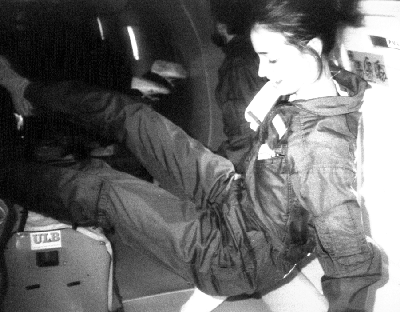
The Chance of a Lifetime
While were all busy sweating through exams a few weeks ago, one PWC student was having the experience of her life. As the rest of us tried to prevent our minds from floating away from studying, Holly B. was actually floating... in zero gravity! Holly, a level three student, got this exciting opportunity through the PWC co-op science course. This course gives students the chance to experience work in a science research environment while still in high school. When she started the course, Holly did not know exactly what type of placement she wanted, but was excited to learn of the chance of a work placement in the Space Systems group at C-CORE, a local engineering institute associated with the university. Hollyís work at C-CORE involved preparing an instrument called the PASCIM (Particle Aggregation and Structure of Clusters in Microgravity) for testing at a NASA facility in Cleveland. The instrument was to be taken on a series of parabolic flights in an aircraft to observe the effects of gravity on the behaviour of particles. Although Holly initially knew about the trip to Cleveland, there was no suggestion of the possibility that she could actually participate. However, as the time drew near, her supervisors felt that since she had been involved with the work at C-CORE, it would be a wonderful experience for her to take part in the testing. Funding was arranged through an organization that provides grants for youth entrepreneurial activities, and Holly was thrilled to learn that she would be able to help with testing in Cleveland. Hollyís ten-day trip to Cleveland was a completely new and exciting experience. While at the NASA facility, she helped assemble the instrument and participated in four testing flights. Each flight consisted of fifty parabolas over a two and a half hour period, with a thirty second zero gravity period for each parabola. Before and after the zero gravity periods, periods of 2G force (stronger than normal gravitational force) occurred. These flights can cause sickness, so Holly was given medication to help avoid this. She also had to wear a special flight suit. Her job during the flights involved recording data and adjusting equipment. She was also the backup in case one of the other members of the flight team became ill. So what does zero gravity feel like? Holly says that it is very hard to describe. "I was floating in the airplane. It was very fun, but strange!" Overall, she had a very exciting trip. "It was an extraordinary experience, something Iíll probably never be able to do again. It was excellent!" 
|


